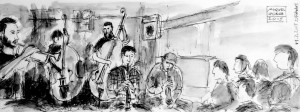Àlex Reviriego (bass)
Roberto Bellatalla (bass)
Miquel Jordà (sopranino sax)
Guillermo Torres (flugelhorn, percussion)
Iván González (trumpet)
I’m a little late (which is becoming a shamefully common opener for reviews on this blog) and enter Robadors 23 to the sound of distant thunder rumbling through the bar. It’s a two-bass night and already my internal organs are receiving a light vibratory massage. Against this backdrop of rapid arco work interspersed with bow-blows to the strings, Torres’ flugel seems to be growling and buzzing its way around the lower registers before dynamics dip and we’re left with just González and Jordà… González’ trumpet throws vibrato-laden bursts against the opposite wall, while Jordà blows his sopranino with a lightweight rubber tube between mouthpiece and neck, tapping, stretching and teasing the sound out in a form of expressive strangulation.
In the absence of drummers, both bassists get percussive: Bellatalla threads a drumstick through the strings for great twanging blows, while Reviriego alternates between pizzicato lines and finger-tapping the instrument’s body. It’s immediately obvious that the bass-plyers are utilising a similar arsenal of techniques (extended and otherwise) and while it’s hardly a cutting competition, there is a back and forth that feels a little duel-like (Àlex did say later that he felt that they’d both studied the same pieces, were coming from the same source). To my uneducated observance, it seemed that Bellatalla was, shall we say, used to being the driver in a group. I felt that the structure of the pieces, the shifts in tone and mood and dynamics, were coming from his lead. This made for a change from the usual Robadors 23 fare, where usually a more evenly collaborative, less hierarchical modus prevails. At this point, Bellatalla erupts with a series of groaning – almost throat-singing – non-verbal vocals. While Jordà’s sopranino becomes more and more subtle, more like manipulated breathing than a traditional sax tone.
In fact, as well as the change to the usual dynamic interplay, the addition of some different playing styles, plus verbalisation, means this week’s session is almost as much art installation as it is a musical event (an impression that was further strengthened by the sound of over-loud voices from the bar area; not unknown in R23 but this week even I, mild-mannered Clark Kent, was compelled to ask them to keep it down).
In the next piece, the basses set up a pounding backdrop, González sets up a short but haunting refrain, Torres sounds like he’s speaking through his horn, while Jordà adds little snake-charmer splashes. Next, a 6-note melody from the trumpet creates an instant framework. Sopranino and flugelhorn lock in briefly before it all dissolves to barely audible three-way minimalism (sublime if only the bar area was a little more respectful – still, it is a bar and not an auditorium, a little conversational background noise is to be expected, I supppose).
In the final improvisation, the two basses adopt different roles – Reviriego with some evocative bowing, and Bellatalla’s fingers running rapidly up and down the fretboard – and it strikes me that without realising it, this is what I’ve been missing: the chance to hear both bassists clearly. As much as I admire Reviriego’s respect for his fellow musician, I’ve not been hearing as much of his playing as usual, and I missed it; the distinct positions allow both instruments to sound forth more clearly.
Meanwhile, things are becoming vocal again, with both Torres and Bellatalla exchanging quasi-operatic free howls and cries playfully butting up against Jordà’s short phrases and González’ textures. As the twin basses rattle to a halt and silence descends, it’s been a humorous finale to a pleasingly unusual R23 session.
(Incidentally, if anybody is wondering how Miquel Jordà managed to draw himself while playing, well, let’s just say, ‘trade secret’ and leave it at that).

